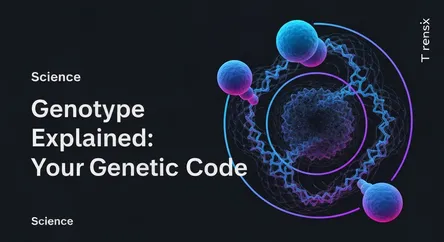Science
Genotype Explained: Your Genetic Code
What is it?
A genotype is the complete set of heritable genes that an organism carries in its DNA. Think of it as the specific genetic blueprint for an individual, referring to the particular combination of alleles—variants of a gene—that determine a specific trait. For example, the genes coding for eye color make up a person's genotype for that characteristic. This genetic code is distinct from the phenotype, which is the observable physical expression of that code, such as having blue eyes. The genotype is the instruction; the phenotype is the result.
Why is it trending?
Interest in genotypes has surged with the rise of personal genomics and direct-to-consumer DNA testing. Services like 23andMe have made it easy for people to explore their genetic heritage and health predispositions. Furthermore, the field of personalized medicine is gaining momentum, using an individual's genotype to tailor medical treatments and predict disease risks. This shift towards data-driven healthcare puts a person's unique genetic information at the forefront of their wellness journey, making the term more common in public conversation.
How does it affect people?
A person's genotype is the foundation of their biological identity, influencing everything from appearance to susceptibility to illnesses like cystic fibrosis or Huntington's disease. Understanding your genotype can empower you to make proactive health choices, such as adopting specific diets or undergoing preventative screenings based on genetic risks. It also plays a crucial role in family planning, helping prospective parents understand the probability of passing on genetic conditions, enabling more informed decisions about their future.
